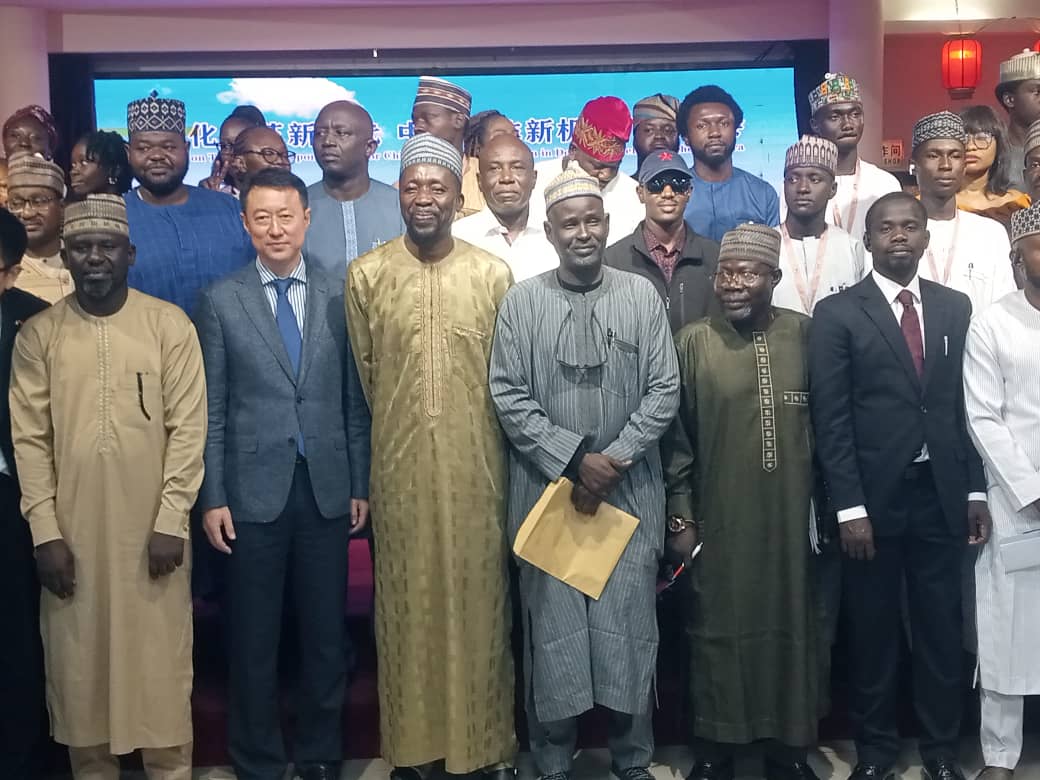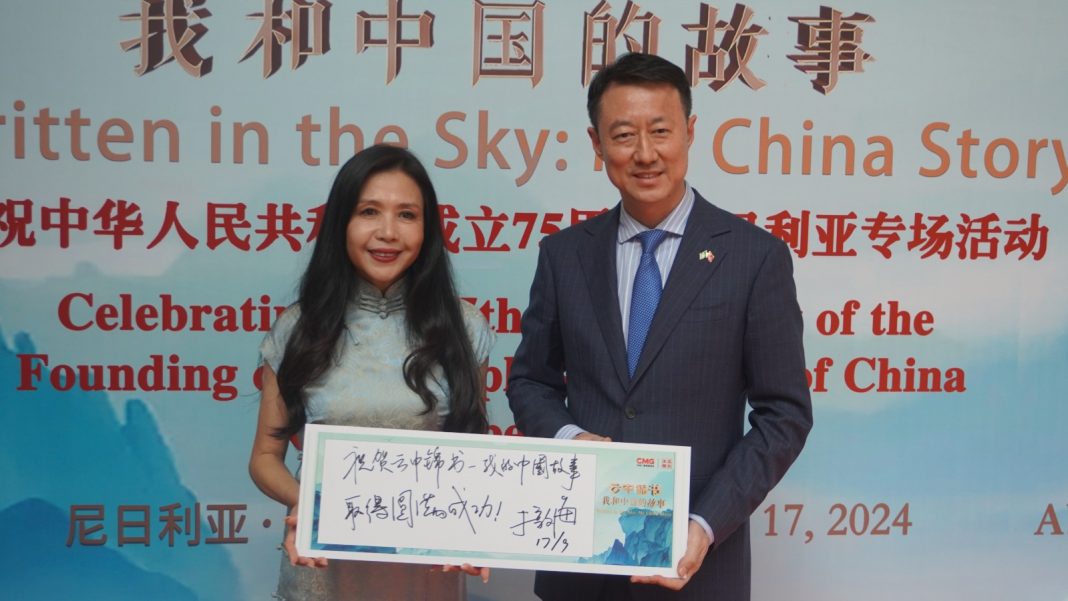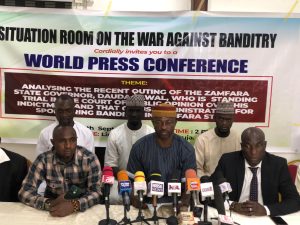By Othuke Evroh
In a significant move to strengthen China-Nigeria Comprehensive Strategic Partnership, the University of Abuja alma mater and the embassy of the People’s Republic of China organized a high-level seminar on, ”Taking New Opportunities for China-Nigeria Cooperation in Deepening Reform in the New Era”.
The event which took place on Thursday, at the Chinese Cultural Centre, Abuja, brought together experts from both countries, government officials in Nigeria and academias from the University of Abuja, to explore new methods for collaboration and economic prosperity.
The seminar focused on key strategic issues such as economic reforms, technology, trade, infrastructure development, security, education, Chinese modernization, China’s opening up and cultural exchanges.
Speaking at the seminar, H.E. Yu Dunhai, Chinese Ambassador to Nigeria, reiterated that deepening reform remains the bedrock to Nigeria-China economic prosperity. Just like China, Nigeria must be ready to embark, execute and embrace economic reforms.
”The topic for today’s seminar originated from the third plenary of the twentieth Central Committee of China which concluded in July. And during the third plenary, we decided to further deepen reform comprehensively to advance Chinese modernization”.
He noted that the third plenary has remained famous to the People’s Republic of China because it changed their fate and transformed China into a modern society.
”There are three famous plenaries.The first plenary was in 1978 and it was about reform and opening up and since then, China actually made a huge turn. And then over the past 40 or 70 years, China embarked on a journey of modernization and the latest one was in July this year. It is hugely important and I will give you four key words about this plenary”, he said.
”The first word is reform. Reform has been a continuous theme of Chinese development. During the last plenary, we adopted three hundred reformation matters. For China, if you look back, China is a country with a really really good record. We always strive to achieve our set goals. For instance, we are good at planning, each five years we had a five year plan, even now, we have one in place and if you look back, we have achieved all those goals set in the five year plan and that has brought us to where we are today”, he stated.
”The secret to China’s success are several and reform is one of them. Reform means that we reform all those who do not fit the realities of our vision and development. For instance, in 1978 when China started its first reform, its per capita GDP was 200 US dollars. And then, it took another twenty years, until year 2,000, China per capita GDP became 12,000 US dollars. Nigeria’s per capita to GDP today is 18,000 US dollars. So, you are in a much much better position than China was. And then it took another ten years, by 2010, China for the first time, surpassed Japan to be the second largest economy in the world. After surpassing Japan, guess what, it took another ten years for China to be three times Japan. China is now almost four times Japan. And all these are indicators to China’s reforms and Opening Up, which is the second key word of the plenary”, he declared.
The Ambassador further noted that the other three key words that advanced China’s economic development include; Opening Up, that is, not closing your doors to the world and the support for free trade as nobody can survive on his own or without the support of others. The third and fourth key words are High Quality Development and Chinese Modernization respectively.
Ambassador Yu Dunhai concluded by stating that Chinese modernization focuses on development and not wars.
”China and Nigeria are strong partners in achieving their common development. Over the years, China has invested in Nigeria and has contributed to the socio-economic development of Nigeria. China’s modernization in many ways falls in line with President Bola Tinubu’s Renewed Hope Agenda and the Eight Priority Areas. And with the right policies, right direction, we could learn from each other, we could benefit from each other. For instance, in poverty reduction, over the past forty years, China lifted 800 million people out of poverty. Even in the past ten years, we lifted 100 million out of poverty. And the good news is the year before last year, China announced that throughout China’s five thousand years history, for the first time, China got rid of absolute poverty. For China, we cross the river by feeling the stones. So while Nigeria fashions its modernization path based on its own national conditions, China and Nigeria will benefit more and achieve economic prosperity by learning and working together”.
Also speaking at the seminar, Professor Sheriff Ghali Ibrahim, HOD of Political Science and International Relations University of Abuja, stated that China has been able to achieve these development feats because of the commitment of the Communist Party of China and experience sharing.
”The formation of a new culture through experience sharing and the formation of the Communist Party of China in 1921 formed the basis for the commencement of the major reforms in China”.
”By 1997, China became a trillion dollar economy in terms of GDP. Forty years after the Reforms and Opening Up, China had become a 12 trillion dollar economy. Then in 2023, China was an over 17 trillion dollar economy. This is what is known as a heavy weight economy. Even the European economies have been bypassed due to the implementation of reforms in China’, he said.
Professor Ghali Ibrahim also noted that these Reforms and Opening Up was what opened up China.
”The reforms and Opening Up allowed others to come into the Chinese economy as well as China also goes to other peoples’ economies for foreign direct investments. That economic interplay gravitated investment into China and China continued to carry out such reforms and today China is the second largest economy”.
”When President Xi Jingping of the Communist Party came, he continued with all the previous reforms but most ultimately deepening reforms. President Xi Jinping implemented what he called the Four Comprehensives which means how to deepen reforms and make China a prosperous society, maintain party discipline and mass urbanization”, he stated and continued.
”The nuances between the major reforms in China and the major reforms in Nigeria is that we have reforms in Nigeria but the question of implementation has always been a problem. China is where they are today because they have successfully implemented major reforms. We have reforms and the problem of policy summersault. So for us to be successful in this Comprehensive Strategic Partnership with China, we must implement major reforms backed by proper policies. We must implement reforms in technology, boost production in our domestic economy. In all our reforms, we must ask China’s hand to enable us to produce domestically and become an export led economy. We must also display fiscal discipline, reduce cost of governance, ensure public official discipline and enhance incremental reforms in the judiciary, public service, education, health care among others”, he concluded.
Other dignitaries who spoke at the seminar include; The representative of the Director of FCT SEB, Mr. Yakubu Ibrahim, Dr. Bibi Faruq, Lecturer at the Department of Political Science, University of Abuja, Muhammad Sulaiman, President of the Society of Nigerian Artists, President of China Alumni Association of Nigeria.
The seminar also featured a question and answer session which provided a platform for in-depth dialogue and advanced discussions.
This seminar marks a new vistas in China-Nigeria Comprehensive Strategic Partnership through deepening reform in the new era.





